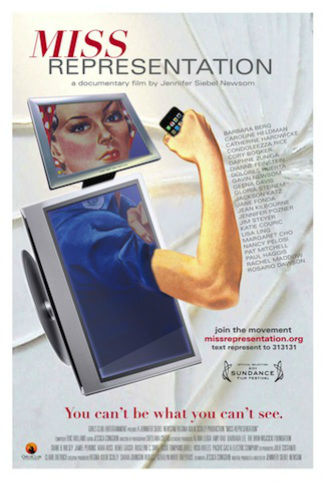 Tags: bodies, children/youth, consumption/consumerism, discourse/language, gender, inequality, marketing/brands, media, political economy, sex/sexuality, social construction, violence, feminism, media literacy, representation, self-objectification, sexism, sexual objectification, stereotypes, symbolic annihilation, 06 to 10 mins, 61+ mins Year: 2011 Length: 90:00, 8:52 Access: no online access, Vimeo preview Summary: Jennifer Siebel Newsom directs this documentary, and following in the steps of the Killing Us Softly films, it draws attention to the very problematic ways women and girls are represented in contemporary media. To tell the story, Newsom weaves together a number of interviews from an array of experts and activists, including Erika Falk, Jennifer Pozner, Jean Kilbourne, Condoleezza Rice, Nancy Pelosi, Cory Booker, Katie Couric, Rachel Maddow, Margaret Cho, Rosario Dawson and Gloria Steinem. The dominant themes of Miss Representation can be described as the consequences of living in a world where one is virtually swimming in representations which consistently emphasize an unattainable beauty standard for women, and in a separate vein, encourage routine violence against women. In this environment, women increasingly self-objectify, they suffer from increased levels of anxiety and depression, a lack of political efficacy, and men increasingly perpetrate violence against women. Despite similarities, Newsom takes her film further than Jean Kilbourne's documentary, Killing Us Softly 4, by exploring more of the political economy behind these harmful representations. Specifically, she explores the large scale entrance of American women into the paid labor force during World War II as a watershed event (see also The Life and Times of Rosie the Riveter). In Newsom's retelling of this story, once men returned to from fighting abroad, the media played a central role in encouraging women to surrender their high-paying jobs back to men in order to become domestic consumers in the brave new post-war economy. Today the marketing of corporations are regulated even less by Congress, and their ads continue to target women; they objectify them as part of a strategy aimed at creating ever more insatiable consumers. Submitted By: Lester Andrist
4 Comments
Kate Fahey
7/2/2013 10:28:18 am
Reply
todd frank
7/20/2022 12:37:21 am
thought the physicians said there is no pills or another way for PENIS ENLARGEMENT !!! I am telling you today that Dr Moses Buba has the product for PENIS ENLARGEMENT and it worked perfectly for me from 3:0 to 8:95 and still counting. Contact Dr Moses Buba for help to Enlarge your penis via Email Address: [email protected] and alo reach him on WhatsApp with mobile number: +2349060529305 Be your brothers keeper by sharing this vital information to other fellow men around the global world connection
Reply
Manuel Franco
7/30/2023 01:22:13 pm
I just want to say Thank You to everyone who supported me through the years. My name is Manuel Franco, New Berlin, Wisconsin. My story of how I won the Powerball lottery of $768.4M is a bit of a tale. I have been playing Powerball tickets for 6 years now since I turned 18. I bought my first ticket on my 18 birthday. I was feeling very lucky that day because I had contacted Dr. Odunga Michael to help me with the winning Powerball numbers. I really had that great great feeling that I looked at the camera wanting to wink at it. I only did a tiny part of it and trusted him. He gave me the numbers after I played a couple other tickets along with it for $10. I checked my ticket after the winnings came online and saw the numbers were correct including the Power play. I screamed for about 10 minutes because it felt like a dream. I had won $768.4M. You can check my winning testimony with the lottery officials just with my name search. Thank you Dr Odunga. Well, his email is [email protected] and you can also call or Whats-app him at +2348167159012 so you guys can contact him
Reply
mark hold
7/8/2024 09:43:39 am
Herbal Penis Enlargement product is 100% guaranteed to Enlarge and get a better ERECTION, the reason why most people are finding it difficult to enlarge Penis is that they believe in medical reports, drugs and medical treatment which is not helpful for Penis Enlargement. Natural roots/herbs are the best remedies which can easily Enlarge your Penis permanently Contact Dr MOSES BUBA via Email: [email protected] or via WhatsApp: +2349060529305. for Natural root and herbal remedies put together to help Enlarge manhood and Erect healthily. I also learn that Dr MOSES BUBA also can cure other types of diseases, HEPATITIS B,DIABETICS,CANCER,HPV,LOW SPERM CAM, HIV/STDS, FIBROSIS LOST OF WEIGHT, BREAST ENLARGEMENT, HIPS and BUMS ENLARGEMENT etc .
Reply
Leave a Reply. |
Tags
All
.
Got any videos?
Are you finding useful videos for your classes? Do you have good videos you use in your own classes? Please consider submitting your videos here and helping us build our database!
|
 RSS Feed
RSS Feed
